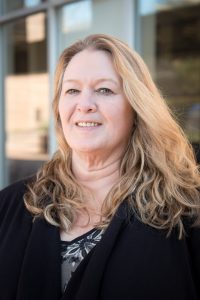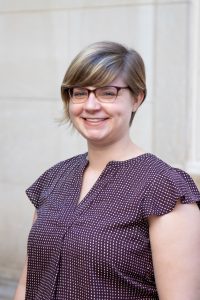
Terry Ottosen, community engagement and health literacy librarian at the HSL (photo by Aleah Howell, University Libraries)

Megan Fratta, community outreach and global health librarian at the HSL (photo by Aleah Howell, University Libraries)
Is a glass of red wine as good as a trip to the gym? Is dark chocolate a health food? A quick Google search suggests as much.
Tantalizing headlines might convince you to read or click, but, often, they are full of misinformation and only loosely based on the research.
Health literacy lies in the ability to cut through the noise and find the facts when it comes to our health care decisions and behaviors. Four librarians from the Health Sciences Library recently used a grant from the National Network of Libraries of Medicine (NNLM) to help rural and underserved communities in North Carolina become better consumers of health information.
Through the grant, Engaging for Health in Rural North Carolina Communities, they visited five public libraries across the state to train local librarians on accessing credible health information. In doing so, they empowered the participants to become stewards of health literacy for the people they serve.
“Public librarians are not always familiar with health resources, and they might be uncomfortable providing health information to their patrons because they don’t want to point them to the wrong resources,” says Terri Ottosen, community engagement and health literacy librarian at the HSL.
“We led workshops to show them how to use credible online sources like MedlinePlus.gov and NCHealthInfo.org, and to provide consumer health information services at their library. When patients and families have reliable health information, they can be active participants in their own care,” says Ottosen.
Megan Fratta, community outreach and global health librarian at the HSL, says another part of health literacy is understanding how to evaluate a health news story—something even researchers, health care providers and seasoned journalists might not be trained to do. As part of her job, she teaches workshops about interpreting scientific studies.
“We look at health news in the media—how these stories go from research studies and findings in published journal articles to sensational headlines like ‘chocolate cures dementia.’ We trace the process information goes through as it gets distorted,” says Fratta.
Health literacy is key to reducing health care disparities and inequities in care for underserved communities, says Ottosen. Basic health literacy skills can empower patients by equalizing their access to health information, helping them advocate for themselves and improving their health outcomes.
Back at Carolina, the group educates students, faculty and providers about speaking in “living room language.”
“It’s a common term in this field. It means, how will you explain this to your nine-year-old cousin in your living room?” says Ottosen. “The entire burden cannot be on patients and families. It’s also on the system and the providers to talk to patients in ways they can understand so that they’ll adhere to the care they need. There has to be mutual awareness here.”
In the future, the team hopes to expand the reach of the HSL’s health literacy efforts throughout the state, especially to public schools.
“I know this is just the beginning. I’ve been on the consumer health literacy side of librarianship for a few decades, and we’re all about empowering the individual. Information is power, and information is our passion,” says Ottosen.


